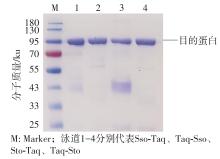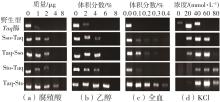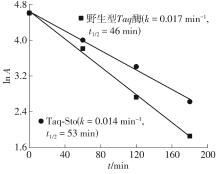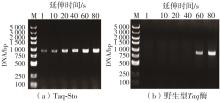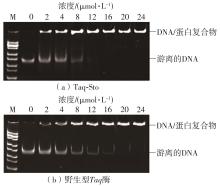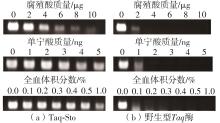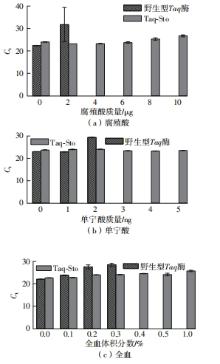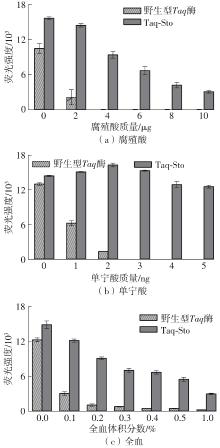Journal of South China University of Technology(Natural Science Edition) ›› 2024, Vol. 52 ›› Issue (4): 8-16.doi: 10.12141/j.issn.1000-565X.230090
• Biological Engineering • Previous Articles Next Articles
Molecular Modification of Taq DNA Polymerase and Its Application in Probe-Based qPCR Direct Amplification System
HU Songqing1 YUAN Jiahui1 LIU Guangyi1,2 HOU Yi3
- 1.School of Food Science and Engineering, South China University of Technology, Guangzhou 510640, Guangdong, China
2.Guangzhou Enzyvalley Biotech Co. , Ltd. , Guangzhou 510555, Guangdong, China
3.School of Light Industry Science and Engineering, South China University of Technology, Guangzhou 510640, Guangdong, China
-
Received:2023-03-06Online:2024-04-25Published:2023-07-12 -
About author:胡松青(1972-),男,教授,博士生导师,主要从事食品蛋白质(酶)结构生物学、天然产物活性物质分离与功能研究。E-mail:fesqhu@scut.edu.cn -
Supported by:the Basic and Applied Basic Research Foundation of Guangdong Province(2021A1515220141)
CLC Number:
Cite this article
HU Songqing, YUAN Jiahui, LIU Guangyi, et al. Molecular Modification of Taq DNA Polymerase and Its Application in Probe-Based qPCR Direct Amplification System[J]. Journal of South China University of Technology(Natural Science Edition), 2024, 52(4): 8-16.
share this article
| 1 | CHIEN A, EDGAR D B, TRELA J M .Deoxyribonucleic acid polymerase from the extreme thermophile Thermus aquaticus[J].Journal of Bacteriology,1976,127(3):1550-1557. |
| 2 | BROCK T D .The value of basic research:discovery of Thermus aquaticus and other extreme thermophiles[J].Genetics,1997,146(4):1207-1210. |
| 3 | EOM S H, WANG J, STEITZ T A .Structure of Taq polymerase with DNA at the polymerase active site[J].Nature,1996,382:278-281. |
| 4 | LAWYER F C, STOFFEL S, SAIKI R K,et al .High-level expression,purification,and enzymatic characterization of full-length Thermus aquaticus DNA polymerase and a truncated form deficient in 5' to 3' exonuclease activity[J].PCR Methods and Applications,1993,2(4):275-287. |
| 5 | AL-SOUD W A, JÖNSSON L J, RÅDSTRÖM P .Identification and characterization of immunoglobulin G in blood as a major inhibitor of diagnostic PCR[J].Journal of Clinical Microbiology,2000,38(1):345-350. |
| 6 | SIDSTEDT M, DSTR M P R, HEDMAN J .PCR inhibition in qPCR,dPCR and MPS:mechanisms and solutions[J].Analytical & Bioanalytical Chemistry,2020,412(9):2009-2023. |
| 7 | AL-SOUD W A, RÅDSTRÖM P .Effects of amplification facilitators on diagnostic PCR in the presence of blood,feces,and meat[J].Journal of Clinical Microbiology,2000,38(12):4463-4470. |
| 8 | AL-SOUD W A, RÅDSTRÖM P .Capacity of nine thermostable DNA polymerases to mediate DNA amplification in the presence of PCR-inhibiting samples[J].Applied and Environmental Microbiology,1998,64(10):3748-3753. |
| 9 | AL-SOUD W A, RÅDSTRÖM P .Purification and characterization of PCR-inhibitory components in blood cells [J].Journal of Clinical Microbiology,2001,39(2):485-493. |
| 10 | SIDSTEDT M, JANSSON L, NILSSON E,et al .Humic substances cause fluorescence inhibition in real-time polymerase chain reaction[J].Analytical Biochemistry,2015,487:30-37. |
| 11 | WU Y H, WEI T, ZHANG X T,et al .Development and evaluation of a direct TaqMan qPCR assay for the rapid detection of diverse carnivore amdoparvoviruses [J].Molecular and Cellular Probes,2019,48:101448/1-5. |
| 12 | GEIGER K, ZACH C, LEIHERER A,et al .Real-time PCR based HLA-B*27 screening directly in whole blood[J].HLA,2020,95(3):189-195. |
| 13 | GEIGER K, LEIHERER A, BRANDTNER E M,et al .Direct blood PCR:TaqMan-probe based detection of the venous thromboembolism associated mutations factor V Leiden and prothrombin c.20210G>A without DNA extraction[J].Clinica Chimica Acta,2019,488:221-225. |
| 14 | SCHRADER C, SCHIELKE A, ELLERBROEK L,et al .PCR inhibitors:occurrence,properties and removal[J].Journal of Applied Microbiology,2012,113(5):1014-1026. |
| 15 | ZHANG Z, KERMEKCHIEV M B, BARNES W M .Direct DNA amplification from crude clinical samples using a PCR enhancer cocktail and novel mutants of Taq [J].Journal of Molecular Diagnostics,2010,12(2):152-161. |
| 16 | KARUNANATHIE H, KEE P S, NG S F,et al .PCR enhancers:types,mechanisms,and applications in long-range PCR[J].Biochimie,2022,197:130-143. |
| 17 | KERMEKCHIEV M B, KIRILOVA L I, VAIL E E,et al .Mutants of Taq DNA polymerase resistant to PCR inhibitors allow DNA amplification from whole blood and crude soil samples[J].Nucleic Acids Research,2009,37(5):e40/1-14. |
| 18 | AREZI B, McKINNEY N, HANSEN C,et al .Compartmentalized self-replication under fast PCR cycling conditions yields Taq DNA polymerase mutants with increased DNA-binding affinity and blood resistance [J].Frontiers in Microbiology,2014,5:408/1-10. |
| 19 | WANG Y, PROSEN D E, MEI L,et al .A novel strategy to engineer DNA polymerases for enhanced processivity and improved performance in vitro[J].Nucleic Acids Research,2004,32(3):1197-1207. |
| 20 | KALICHUK V, BÉHAR G, RENODON-CORNIÈRE A,et al .The archaeal "7kDa DNA-binding" proteins:extended characterization of an old gifted family[J].Scientific Reports, 2016,6:37274/1-10. |
| 21 | WU J, de PAZ A, ZAMFT B M,et al .DNA binding strength increases the processivity and activity of a Y-Family DNA polymerase[J].Scientific Reports,2017,7:4756/1-12. |
| 22 | 胡松青,张金桂,刘光毅,等 .一种直扩型Bst DNA聚合酶及其制备方法与应用,CN115094047A [P].2022-09-23. |
| 23 | BAAR C, D’ABBADIE M, VAISMAN A,et al .Molecular breeding of polymerases for resistance to environmental inhibitors[J].Nucleic Acids Research,2011,39(8):e51/1-12. |
| 24 | OSCORBIN I P, BELOUSOVA E A, BOYARSKIKH U A,et al .Derivatives of Bst-like Gss-polymerase with improved processivity and inhibitor tolerance[J].Nucleic Acids Research,2017,45(16):9595-9610. |
| 25 | DATTA K, LICATA V J .Salt dependence of DNA binding by Thermus aquaticus and Escherichia coli DNA polymerases[J].Journal of Biological Chemistry,2003,278(8):5694-5701. |
| 26 | YAMAGAMI T, ISHINO S, KAWARABAYASI Y,et al .Mutant Taq DNA polymerases with improved elongation ability as a useful reagent for genetic engineering[J].Frontiers in Microbiology,2014,5:461/1-10. |
| 27 | YAMAGAMI T, MATSUKAWA H, TSUNEKAWA S,et al .A longer finger-subdomain of family A DNA polymerases found by metagenomic analysis strengthens DNA binding and primer extension abilities[J].Gene,2016,576:690-695. |
| 28 | HELLMAN L M, FRIED M G .Electrophoretic mobility shift assay (EMSA) for detecting protein-nucleic acid interactions[J].Nature Protocols,2007,2(8):1849-1861. |
| [1] | XU Xilin, ZHONG Shuying, ZHOU Xiaoli, et al. Safety Evaluation and Probiotic Characteristics of Enterococcus faecalis EF-ZA1107-06 [J]. Journal of South China University of Technology(Natural Science Edition), 2022, 50(11): 52-61. |
| [2] | HU Yucong, LUO Mingming, PAN Lei, et al. Study on the Choice of Morning Peak Departure Time of Heterogeneous Car Commuters Considering Travel Anxiety [J]. Journal of South China University of Technology(Natural Science Edition), 2022, 50(11): 14-24. |
| [3] | LIU Wei-dong TU Yu-ting LIU Hai-ming. State Vector Model of Geometry Tolerance and Techniques for Tolerance Analysis and Synthesis [J]. Journal of South China University of Technology (Natural Science Edition), 2016, 44(5): 78-83,89. |
| [4] | Han Dong Xiao Wen-jun Li Mei-sheng. EBSN: a New Model with Full-Structure for Modular Data Center [J]. Journal of South China University of Technology (Natural Science Edition), 2015, 43(1): 92-98. |
| [5] | Wu Bo Qin Meng-yang Ye Bang-yan He Ai-dong. Experimental Investigation into Scatter of Surface Residual Stress Caused by Turning [J]. Journal of South China University of Technology(Natural Science Edition), 2012, 40(7): 73-77. |
| [6] | Yang Wei Chen Sheng-zhou Dong Xin-fa Lin Wei-ming. Preparation and Performance of Co-N-C Electro-Catalysts for Direct Methanol Fuel Cell [J]. Journal of South China University of Technology(Natural Science Edition), 2012, 40(3): 10-14. |
| [7] | Li Li-li Ye Mei-li Ye Yan-rui Lin Ying. Correlation Between Stress Tolerance and Fermentation Behavior of Saccharomyces cerevisiae [J]. Journal of South China University of Technology (Natural Science Edition), 2011, 39(9): 134-139. |
| [8] | Zhang Yan-ting Fan Xiao-lei Li Xiao-ping Guo Rong-bo. Screening of Oxygen-Tolerance Phenotypes in Hydrogen-Producing Strains of Chlamydomonas moewusii with Ultraviolet Radiation [J]. Journal of South China University of Technology (Natural Science Edition), 2011, 39(5): 149-153. |
| [9] | Liu Guo-liang Chen Shu-yu Xu Guang-xia Chang Guang-hui. Two-Level Checkpoint Algorithm Based on Dynamic Grouping [J]. Journal of South China University of Technology (Natural Science Edition), 2011, 39(2): 141-147. |
| [10] | Luo Jian-fei Lin Wei-tie Guo Yong. Detection of Viable Bacterium Cells Based on Propidium Monoazide in Combination with PCR [J]. Journal of South China University of Technology (Natural Science Edition), 2010, 38(9): 142-146. |
| [11] | Cao Xiao-hua Zhou Yong. Fault-Tolerant Algorithm Based on Active Request and Dynamic Load Distribution for CAN System [J]. Journal of South China University of Technology (Natural Science Edition), 2010, 38(9): 30-34. |
| [12] | Ye Yan-rui Zhu Yi Li Li-li Lin Ying Du Hong-li Han Shuang-yan. Response of Metabolic Pathway of Trehalose in Heat-Resistant Yeast Saccharomyces cerevisiae to Heat Stress [J]. Journal of South China University of Technology (Natural Science Edition), 2010, 38(5): 139-143. |
| [13] | Xu Yi Li Long-shu Li Xue-jun. Improved LEM2 Algorithm for Incomplete Information System [J]. Journal of South China University of Technology (Natural Science Edition), 2010, 38(11): 104-109. |
| [14] | Li Di Wan Jia-fu Ye Feng Lai Yi-zong . Effect of Time Characteristics of Software NC Real-Time Tasks on Manufacturing Accuracy [J]. Journal of South China University of Technology (Natural Science Edition), 2009, 37(2): 1-6. |
| [15] | Guo Qing-wei Hu Yong-you Zheng Bing-hui Xie Lei Hu Chun-ming Wang Xin Zhang Tai-ping. Screening of Grasses for Slope Protection of Urban Rivers in Shenzhen City [J]. Journal of South China University of Technology (Natural Science Edition), 2007, 35(6): 137-142. |
| Viewed | ||||||
|
Full text |
|
|||||
|
Abstract |
|
|||||


